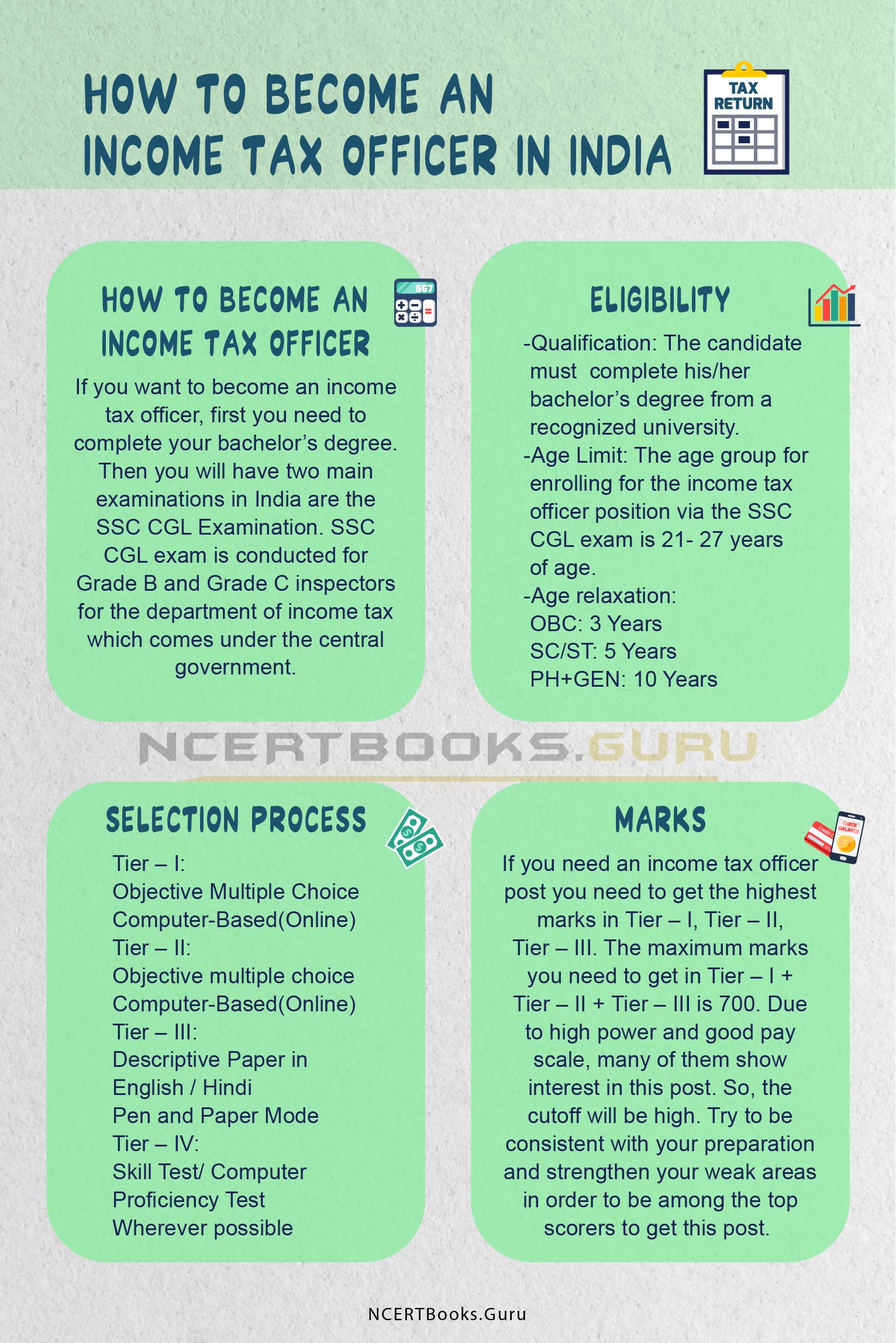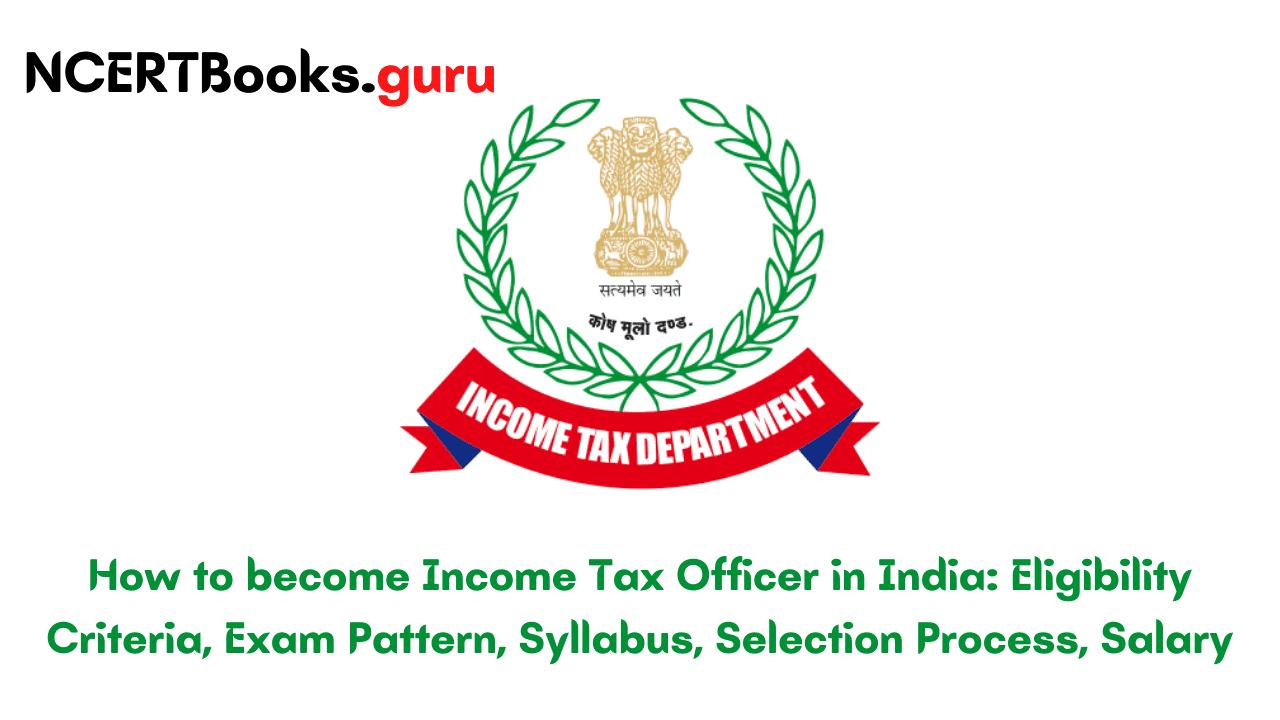These days youth are mainly focussing and showing their interest to do government jobs. Once after completion of their graduation, they start searching for government jobs as per their skill set or preference. In those government jobs, one of them is an income tax officer (ITO). A career as an income tax officer is the most prestigious job offered by the central government through the examinations.
In this article, we are going to discuss “How to become an income tax officer in India”, eligibility criteria, exams, and role of an income tax officer, and many more. Read the article thoroughly to understand the complete process to become an income tax officer.
- How to become an Income Tax Officer?
- Income Tax Officer Eligibility Criteria
- Selection Process to become Income Tax Officer in India
- SSC CGL Examination Pattern
- How many marks do you need to get for an income tax officer post?
- Income Tax Officer Syllabus
- Key Skills needed for becoming an Income Tax Officer
- Income Tax Officer Salary in India
How to become an Income Tax Officer?
If you want to become an income tax officer, first you need to complete your bachelor’s degree. Then you will have two main examinations in India are the SSC CGL Examination. SSC CGL exam is conducted for Grade B and Grade C inspectors for the department of income tax which comes under the central government. We are providing you the eligibility criteria, examination structure, and selection process that will guide you towards your dream.
Income Tax Officer Eligibility Criteria
If you want to be eligible for the post of income tax officer, you must fulfill the following eligibility criteria including qualification and age limit.
Educational Qualification for Income Tax Officer
The candidate must complete his/her bachelor’s degree from a recognized university.
Age Limit
The age group for enrolling for the income tax officer position via the SSC CGL exam is 21- 27 years of age. And for some categories, we have age relaxations.
We will see that list in below table:
| Category | Age Relaxation |
|---|---|
| OBC | 3 Years |
| SC/ST | 5 Years |
| PH+GEN | 10 Years |
| PH+OBC | 13 Years |
| PH+ SC/ST | 15 Years |
| Ex – Servicemen(Gen) | 3 Years |
| Ex – Servicemen(OBC) | 6 Years |
| Ex – Servicemen(SC/ST) | 8 Years |
Candidates should also fulfill the physical standard and physical fitness requirements. We have separate requirements for male and female candidates.
Male Candidates
Physical requirement:
Height – 157.5 cms
Chest – 81 cms
Physical fitness:
Walking: 1600 meters in 15 minute
Cycling: candidates must ride 8 kilometers in 30 mins.
Female Candidates
Physical Requirement:
Height – 152 cms
Weight – 48 kgs
Physical Fitness:
Walking: candidates must walk 1Km in 20 minutes
Cycling: candidates must ride 3kms in 25 minutes.
Selection Process to become Income Tax Officer in India
The selection process for the SSC CGL examination has 4 stages. You need to qualify in all these stages and followed by an interview, physical requirement, physical fitness, and medical test. Now we will look into the stages to qualify for an income tax officer post in India.
| Tier | Type | Mode |
|---|---|---|
| Tier – I | Objective Multiple Choice | Computer-Based(Online) |
| Tier – II | Objective multiple choice | Computer-Based(Online) |
| Tier – III | Descriptive Paper in English / Hindi | Pen and Paper Mode |
| Tier – IV | Skill Test/ Computer Proficiency Test | Wherever possible |
SSC CGL Examination Pattern
As we have seen above there will be 4 stages in this SSC CGL exam. I am going to discuss the syllabus you need to read for these exams. You can prepare from the SSC CGL Books to be well versed with all the topics.
First, we will see Tier – I exam pattern and also exam syllabus
| Subject | Number of questions | Marks | Duration |
|---|---|---|---|
| General Intelligence and General Awareness (Part A) | 100 | 100 | 2 Hours |
| Arithmetic (Part B) | 100 | 100 | 2 Hours |
Tier-II Exam Pattern
| Subject | Marks | Duration |
|---|---|---|
| General Studies | 200 | 3 Hours |
| English | 100 | 2 Hours 20 Minutes |
| Arithmetic | 200 | 4 Hours |
| Language | 100 | 2 Hours 40 Minutes |
| Communication Skills and Writing | 200 | 2 Hours 20 Minutes |
Candidates qualified in the Tier – II exam will write the SSC CGL Tier – III exam consisting of a written exam where candidates will be required to appear for a descriptive test. Get the details of the SSC CGL Tier – III Exam Pattern.
| Tier | Scheme of Examination | Maximum Marks | Time Allocated |
|---|---|---|---|
| Tier – III | Descriptive Paper in English or Hindi (Writing of Essay/ Precis/ Letter/ Application, etc.) |
100 | 60 Minutes For VH/ OH (afflicted with Cerebral Palsy/ deformity in writing hand- 80 Minutes |

How many marks do you need to get for an Income Tax Officer Post?
If you need an income tax officer post you need to get the highest marks in Tier – I, Tier – II, Tier – III. The maximum marks you need to get in Tier – I + Tier – II + Tier – III is 700. Due to high power and good pay scale, many of them show interest in this post. So, the cutoff will be high. Try to be consistent with your preparation and strengthen your weak areas in order to be among the top scorers to get this post.
Also, Check:
- How to become an IPS Officer in India
- How to become an IRS Indian Revenue Service Officer in India
- How to become a PCS Officer in India
Income Tax Officer Syllabus
The student who comes under the eligibility criteria and gets selected for the exam can refer to the Income-tax officer exam syllabus. I have mentioned a few syllabus details below which will give you an idea of which kind of topics you have to cover for the income tax officer exam. The syllabus pattern usually gets changed as per the requirement. So, in my opinion, before starting preparation for ITO better follow the updated exam pattern for the best result.
| Income Tax Officer Syllabus | Topics |
|---|---|
| Reasoning |
|
| Numerical Aptitude |
|
| English |
|
| General Awareness |
|
Key Skills needed for becoming an Income Tax Officer
Below are some of the skills you need to require to become an income tax officer in India.
Communication Skills: As an Income Tax Officer you will be required to communicate with accountants, companies, lawyers, and colleagues. Effective communication is the main aspect of this career.
Numerical Ability: Income Tax Officer is required to assess the financial information of individuals, businesses, government, and public professionals.
Time Management: Income Tax Officer often requires to work for extra hours in the completion of the financial year. He or she is responsible for ensuring the ITR filed by assesses is accurate and there is any fraud of hiding assets involved.
Attention to Detail: Income Tax Officer requires to pay attention to detail in order to investigate, survey, rectify and assess Income Tax.
Income Tax Officer Salary in India
The in-hand salary for an income tax officer lies in the range of 57000 to 66000. But the salary of an income tax officer may vary from city to city. Once we will look into the structure of an income tax officer post.
| Particulars | Amount | |
|---|---|---|
| Payscale | Rs 47,600 to 1,51,100 | |
| Grade Pay | 4,800 | |
| Basic Pay | Rs 47,600 | |
| HRA (depending on the city) | X Cities (24%) | 11,424 |
| Y Cities (16%) | 7,616 | |
| Z Cities (8%) | 3,808 | |
| DA (Current – 17%) | 8,092 | |
| Travel Allowance | Cities – 3,600, Other Places – 1,800 | |
| Gross Salary Range (Approx) | X Cities | 70,716 |
| Y Cities | 66,908 | |
| Z Cities | 63,100 | |
FAQs on How to become Income Tax Officer in India
1. Is an income tax officer a good job?
In a career as an income tax officer, you need to do both desk work as well as exciting fieldwork. An income tax officer job role is considered a reputable and most demanding role. It provides a proper work-life balance.
2. What is the age limit for an income tax officer?
The age limit for income tax officers should not exceed more than 30 years.
3. What exam should I take to become an income tax officer?
You must appear for the SSC CGL examination to get the post of income tax inspector.
Summary
We hope everyone you have got the answer to having doubts about eligibility, examinations, and syllabus you need to read. As, I am concluding this article here, Still if you have any other doubts about the topics we have covered above you can comment below.
